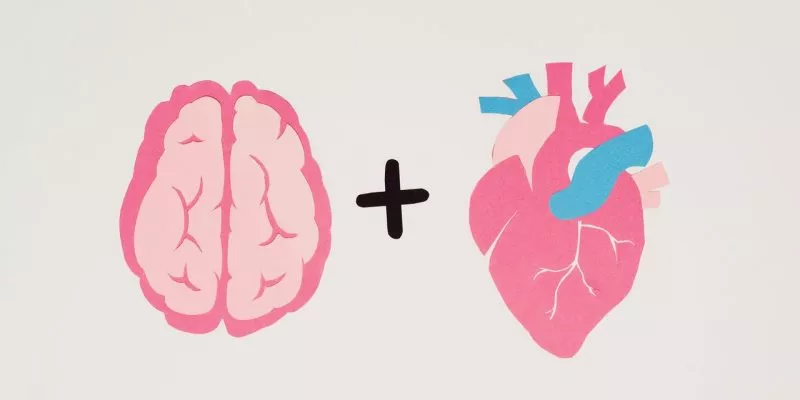As we all know, emotions can significantly impact our lives. They can cause us to make irrational decisions, feel stressed, and even lead to anxiety or depression in some cases. But what most people don't know is that there is a part of the brain that controls our emotions.
The brain is a highly complex organ. Divided into two parts, the left and the right side, each piece controls different functions. The left side controls language, logical thinking and reasoning, and mathematical problems. The right side handles intuitive, spatial, social, and artistic skills.
The part of the brain responsible for emotions is called the limbic system. It's also known as the emotional brain. The limbic system is part of the central nervous system, including the cerebral cortex and brain stem. The limbic system is located under the cortex and beneath the cerebellum.

What is the limbic system?
The limbic system is a group of structures located in the middle of the brain responsible for regulating basic emotions, forming memories, and processing certain types of information. It also mediates attention and alertness. It consists of the hypothalamus, the amygdala, the thalamus, and the hippocampus.
The hypothalamus controls hormones and other functions such as body temperature and hunger. It's also in charge of most other homeostatic functions of your body such as sleep cycles and hormone secretion levels.
The amygdala is responsible for interpreting emotional stimuli and relaying them to the rest of the brain; it also directs attention. It plays an important role in your fight-or-flight response to danger or stress. New memories are processed and stored as long-term memories in the hippocampus, and the thalamus relays motor and sensory signals to the cerebral cortex.
How does the limbic system work?
The limbic system is where emotions are processed and stored. In this way, it helps to shape behavior. For example, if you smell cookies baking, your hypothalamus will begin to secrete a hormone that stimulates your appetite. Your amygdala will start to release endorphins that make you happy whenever you think about cookies or smell them baking. If you had a bad experience with cookies when you were younger—perhaps they made you sick—your amygdala would react differently to those cookies than someone who has no negative association with them.
Research has shown that stimulating parts of the limbic system can change a person's emotional state. Deep brain stimulation uses electrical signals to stimulate parts of the brain and has been used to successfully treat depression and anxiety by affecting how individuals feel emotions. In essence, the vital component of the system can turn up or turn down our ability to feel emotions.
What are emotions?
Emotions are the feelings we have and how we represent them to ourselves and others. They are how we react to situations, events, and things around us. Emotions are also hardwired into our brains and bodies, so they're a natural part of being human. They can be positive or negative, familiar or unfamiliar, but they all have something in common: they can help us make sense of our world.
Emotions are an integral part of human existence. It is a primary driving force in our life decisions and has a significant role in the way people live their lives. The emotions we feel, such as sadness, anger, fear, and joy, make us human, not just intelligent animals. Emotions help us live fulfilling lives by motivating us to do worthwhile things.
Emotions can be classified into two main groups: positive emotions and negative emotions. Positive emotions include happiness, joy, love, and gratitude, while negative emotions include anger, disgust, sadness, anxiety, and guilt. There are also many other types of emotion, including excitement, pride, amusement, nostalgia (a kind of longing for the past), shame (a painful feeling about yourself), and awe (an overwhelming sense of admiration for something).
Some emotions, like happiness and fear, are related to our survival; when we experience those feelings, we become more alert or careful. Like love or hate, other emotions have no direct impact on our survival; however, they can be just as powerful.
Happiness is caused by external factors such as wealth and health and internal factors such as personality traits and relationships with other people. Fear is influenced by the same external and internal factors and threats in the environment. All of these causes result in different emotional reactions.
Some emotions are pleasant; for example, the excitement you feel when you achieve something you have worked hard for is enjoyable rather than unpleasant. Others are unpleasant; for example, feeling fear when you see a threatening dog coming toward you can be scary or even terrifying. Emotionally intelligent people recognize their own emotions and understand why they react to situations in a certain

Are emotions important?
For a long time, we've been told to avoid them. We've been taught to play it cool. We've learned that being emotional is a sign of weakness and that walling ourselves off from feeling anything at all is the best way to live our lives. However, the truth is that emotions are what make us human, and it's impossible to be happy without them. It's the encompassing of our mental health.
Empathy—the ability to understand the feelings of others—has become one of the most sought-after skills in today's world. It's even been said that "empathy is the new IQ," as it's becoming increasingly important in a world where more and more people are interacting with each other. Understanding another person's emotions allows you to connect with them on a deeper level. This is why people with high emotional intelligence have such fulfilling relationships; they know how to read others and can navigate social situations better than others. To be successful, you must learn how to manage your own emotions and understand those around you to connect.
How can we be more emotionally intelligent?
Most successful people in life are emotionally intelligent or have a heightened level of emotional intelligence. Emotional intelligence is defined as the ability to recognize the emotions of yourself and others. It has been found that people with high EQ have a higher chance of success in their relationships, work, and overall life than those who do not. Here are some ways you can improve your emotional intelligence:
Start with self-awareness
This is one of the most critical aspects of emotional intelligence. If you cannot identify your own emotions and their source, it will be difficult for you to manage them effectively. The first step to improving your emotional intelligence is identifying your feelings and understanding why you feel the way you do.
Practice mindfulness
Mindfulness is another important aspect of emotional intelligence because it helps you learn how to distance yourself from your emotions to manage them well. When a feeling arises in you, try to observe it without judgment or criticism—notice its presence and allow it to pass through you without acting on it impulsively or saying something that you might later regret. Mindfulness is also helpful for your mental health.
Reflect
Do an inventory of your past experiences. Try to identify what happened and what you did to cope with these situations. Reflecting on how you reacted to these situations will help you become more prepared when faced with the same events in the future. Reflecting also helps boost our personal development.
Emotions are an essential part of how we interact and survive in the world. We can't live without them. They guide our thinking, provide motivation for action, and drive us towards goals. But if you don't understand your emotions, they can also lead to poor decisions, destructive behavior, and a host of negative outcomes.
Develop a strong emotional intelligence! Sign up for personal development courses at Skill Success.

